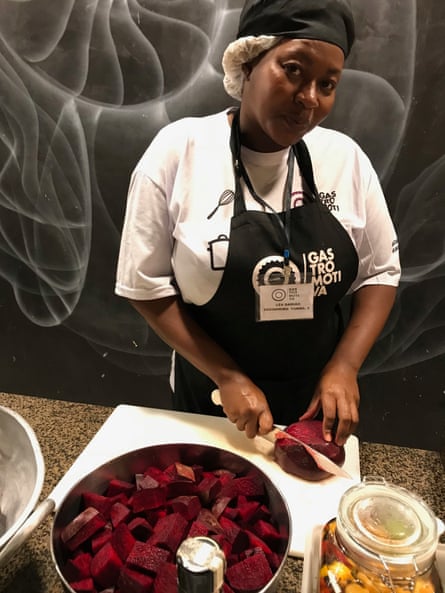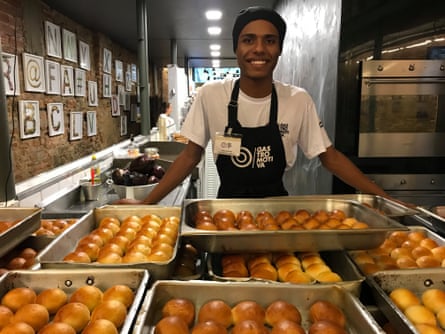Supper Club for Homeless People Cafeteria That Feeds the Homeless
I n a chic, minimalist restaurant with an Italian name and an innovative menu, near the centre of Rio de Janeiro, Valdicir dos Santos tucks into his dinner. It consists of banana skin and vegetables served with tangerine sauce, beans, rice and farinha – the flour, ground from dried bread instead of the usual manioc, that Brazilians sprinkle on everything.
The food at Refettorio Gastromotiva is excellent – and Dos Santos is one of 90 people eating here for free.
"I'm a regular," says Dos Santos, a homeless man, who has a salad to start and banana ice cream, strawberries and granola for dessert. "It's a real find, because the food is well selected."
Refettorio Gastromotiva, which opened in August 2016, just before the Olympic Games, is a unique project in a city blighted by poverty and rising homelessness. Those who eat here – abandoned by a country where inequality runs deep and the economy is still crawling out of a crippling recession – say its meals offer a rare moment of humanity.
The restaurant's food is donated by companies that would otherwise throw it away, and prepared by a team of trainees led by professional chefs. They are adept at turning what would otherwise be waste into appetising menus. The diners, who are served the food by volunteers, are selected by different non-profit groups. Dos Santos was invited by a charity working with the homeless; other diners are immigrants from the Democratic Republic of the Congo.
Most of the team cooking here are from favelas and low-income communities. All negotiated a tough selection process to claim a place on a three-month training course leading to a diploma.

"When you don't have a diploma or specialisation, you can't move forward in life," says Léa Damião, 38, a trainee and mother of three from Rio's Vigário Geral favela, as she helps to prepare tonight's meal. She worked as a manicurist for 16 years, but always loved cooking. "I want to be a chef one day," she says.
Damião fell "in love" with the work at Gastromotiva, which pays her travel and also covers her meals at work. She has since finished the training, but comes back every week to volunteer. "The course was totally free and I think I owe something," she says.
Gastromotiva's co-founder, Brazilian chef David Hertz, 44, says the concept, called "social gastronomy", is growing worldwide. He travels incessantly, looking at new initiatives.
"For us, fighting food waste is a way of generating meals for people who need them, people in need," he says. "Gastronomy for us is the means, not the end. It is a means for social inclusion."
Born in Curitiba, in southern Brazil, Hertz travelled for seven years before moving back to Brazil and studying gastronomy. He became a chef at Santo Grão, an upscale restaurant in São Paulo city. But his view of cooking was transformed in 2004, when he visited a kitchen in a favela in the city's gritty, low-income suburbs – the periferia.
"It was my first time in a favela," he says, "and what I saw that day would transform my life forever."
Hertz launched a project called Cozinheiro Cidadão, or "Citizen Cook", to train people from disadvantaged neighbourhoods, and developed the project into Gastromotiva. By 2013, the word "social gastronomy" was being used to other similar initiatives, such as his friend Jamie Oliver's Fifteen restaurant, which trains chefs from underprivileged backgrounds, and San Francisco's La Cocina, which according to its mission statement "cultivates low income food entrepreneurs".

Five years ago, Gastromotiva moved to Rio. It has since opened cooking schools in partnership with universities for underprivileged youth in Curitiba, Mexico, El Salvador and South Africa. About 70-80% (approximately 4,500 people) of those who have trained at Gastromotiva projects have since found full-time work, says communication and marketing director Mariana Vilhena.
In 2015, Italian chef Massimo Bottura – a close friend of Hertz's who was later named the world's best chef – opened Refettorio, a restaurant serving the homeless in the impoverished Geco district of Rome. Together with his wife, Lara Gilmore, Bottura later launched Food for Soul, which aims to "fight food waste through social inclusion". The organisation has since opened canteens in Paris and London.
In 2016, just before the Olympic Games, Bottura and Hertz teamed up with journalist Ale Forbes to open Refettorio Gastromotiva in Rio de Janeiro's Lapa area, where homeless people congregate and many sell second-hand goods on blankets spread out on the sidewalk.

Inside the canteen, three immigrants from the DRC are dining. Paulo Mbengi, 37, fled hunger and war at home two years ago and came to Brazil as a refugee, but he has not been able to find work and lives in a distant Rio favela. "Brazil does not give assistance to our people," he says.
Refettorio Gastromotiva is the exception.
"The food is good here," says Mbengi. "I will come back."
Pedro de Souza, 50, a formerly homeless man also enjoying a meal, says Refettorio Gastromotiva offers vulnerable people like him more than just a good meal.
"You eat new things, new menus. It's a new way to be served. You interact with other people. There is a whole sociability in the project," he says. "They don't just socialise the homeless, they humanise us."
Source: https://www.theguardian.com/global-development/2018/nov/05/more-than-a-meal-swanky-rio-de-janeiro-restaurant-for-homeless-people-refettorio-gastromotiva
0 Response to "Supper Club for Homeless People Cafeteria That Feeds the Homeless"
Postar um comentário